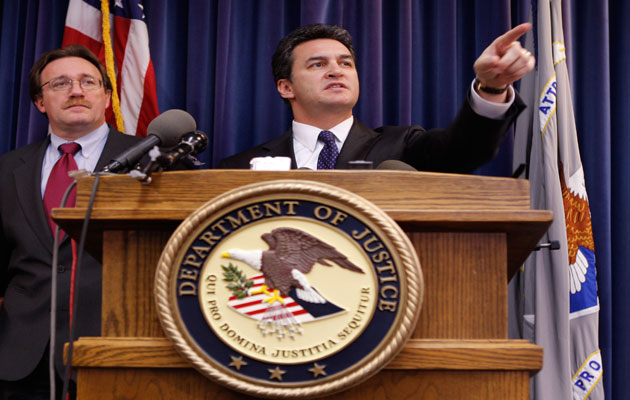FIFA needs a leadership wedded to the concept of 20/20 transparency as it seeks to restore its reputation with the wider football family and the public at large.
In setting out his prescription for the world football federation in London today, its independent ethics investigator Michael Garcia raised two themes which should command attention in next year’s presidential election.
However the New York attorney’s finely-judged remarks could not be interpreted as personal criticism of president Sepp Blatter or anyone else, merely his assessment of the critical evolution essential to the FIFA body politick.
His comments were fully in line with his formal recent statement that his report into the 2018-2022 World Cup bid scandal should be made public. At present the 430-page report is sitting in the in tray of Munich judge Hans-Joachim Eckert.
An interim statement by Eckert has been promised for early next month.
Garcia was in London to deliver a keynote address at a white collar crime conference organised by the American Bar Association.
Garcia explained FIFA’s role in sport and his independent role as defined by the code of ethics.
He said: “I have the right to open my own investigation into issues of my own choosing. In the world of international sport that arrangement is truly extraordinary. Look at the International Olympic Committee: even its own ethics commission has to wait for a referral from the IOC.”
He explained that every football was committed to providing information and answer questions when requested and refusal would spark suspension.
“That has happened,” said Garcia, albeit without naming names of such refuseniks but who had included world football personalities such as Germany’s Franz Beckenbauer.
Illustrating the difference of working in international sport compared with the corporate environment, Garcia noted the difficulties created “because there is no central repository of documents or central server for emails.”
The absence of any ability to issue a judicial subpoena complicated assessments of an individual’s credibility and compliance.
As he said: “This is an ethics committee, not criminal law. The most we can do is fire or suspend someone from sport . . . without a Department of Justice to turn to, a major challenge is making sure the Code of Ethics is more than just a code of rules on the website.”
This was where Garcia turned to the essential specifics of transparency and leadership.
He said: “The value of transparency is evident from the experiene of other sports organisations. Look at the IOC, where allegations concerning Salt Lake City [and its Winter Olympics bid] were addressed and published and the IOC moved forward.
“Without transparency, problems and scepticism have lingered. We’ve seen that recently with the NFL . . . which has had to bring in outside counsel to investigate its own investigation.
“Greater transparency would help foster a culture of compliance internally and foster confidence among the public and sponsors. It is not intended to harm certain officials or the organisation by showing what went wrong. It’s quite the opposite.
“Where the organisation has taken significant steps forward then transparency provides evidence of it to the public. It’s one thing to tell people a rigorous a process is in place, it’s another thing to show them.”
Then Garcia turned to leadership.
This is issue all of its with incumbent but ageing president Sepp Blatter favourite to win election next May for a fifth term. Only French former FIFA official Jerome Champagne has declared a rival candidacy though ex-Chilean federation president Harold Mayne-Nicholls is considering whether to stand.
Garcia said: “What an instituton like FIFA needs to meet the challenge of ethics enforcement is leadership. An ethics committee is not a silver bullet. What is required is a leadership that sends out a message it wants to understand and learn from any mistakes the ethics committee may identify.
“It is that kind of leadership that breathes life into a Code of Ethics. Reform doesn’t come from new rules and new committees but from changing the culture of the organisation. That is the path forward for ethics in sport.”







